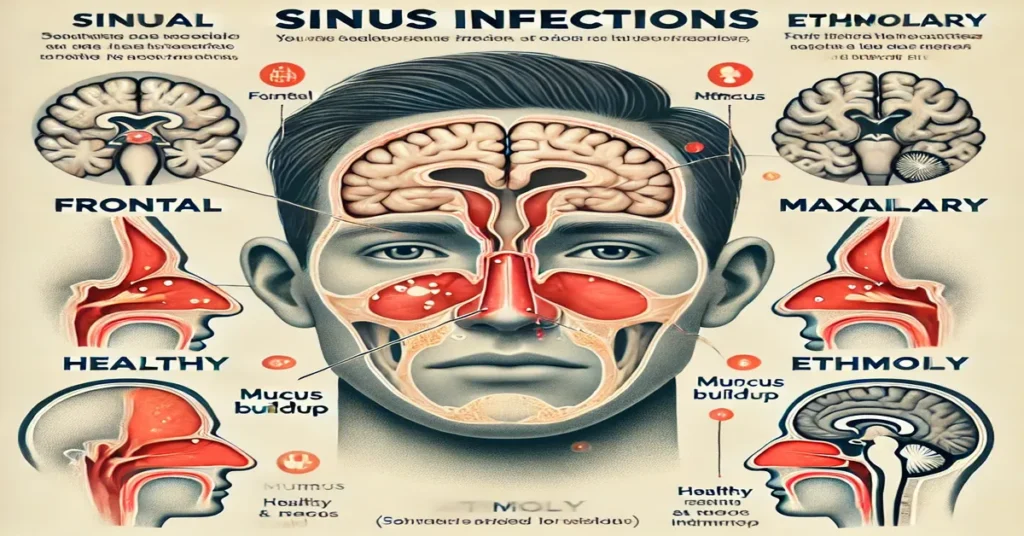Sinus infections, also known as sinusitis, are a common ailment affecting millions of people worldwide. Often mistaken for the common cold, sinus infections can result from various causes, including bacterial, viral, or fungal infections, as well as allergies or environmental irritants. A key question many people ask is: are sinus infections contagious? The answer depends on the underlying cause of the infection. In this article, we will explore the nature of sinus infections, their causes, symptoms, types, treatments, prevention strategies, and whether or not they are contagious.
Understanding Sinus Infections
The sinuses are air-filled cavities located in the skull behind the forehead, nose, cheeks, and eyes. They are lined with a layer of mucus-producing tissue that helps to trap dust, germs, and other particles. When these sinuses become inflamed or infected, the condition is known as sinusitis.
Causes of Sinus Infections
The causes of sinus infections can be broadly classified into infectious and non-infectious factors:
- Viral Infections:
- The majority of sinus infections are caused by viruses, often stemming from the common cold. Viral sinus infections are generally not considered contagious beyond the initial cold.
- Bacterial Infections:
- In some cases, a bacterial infection develops when the sinuses become blocked and mucus builds up, creating a breeding ground for bacteria.
- Fungal Infections:
- Rare but serious, fungal infections in the sinuses occur more commonly in people with weakened immune systems.
- Allergic Reactions:
- Allergens such as pollen, mold, or pet dander can trigger sinus inflammation.
- Environmental Irritants:
- Smoke, pollution, or chemical fumes can irritate the sinuses and lead to inflammation.
- Structural Issues:
- Conditions like a deviated nasal septum, nasal polyps, or other anatomical abnormalities can contribute to chronic sinusitis.
Types of Sinusitis
Sinus infections are categorized based on their duration and underlying cause:
- Acute Sinusitis:
- Lasts up to four weeks and is typically caused by viral infections.
- Symptoms include nasal congestion, facial pain, and thick nasal discharge.
- Subacute Sinusitis:
- Persists for 4 to 12 weeks and may result from unresolved acute sinusitis.
- Chronic Sinusitis:
- Lasts 12 weeks or longer and can be caused by persistent infection, allergies, or structural problems.
- Recurrent Sinusitis:
- Occurs when a person experiences multiple episodes of acute sinusitis within a year.
Are Sinus Infections Contagious?
The contagiousness of a sinus infection depends on its cause:
- Viral Sinus Infections:
- A viral sinus infection itself is not contagious. However, the underlying cold or respiratory virus that triggers the infection can spread to others through respiratory droplets. If someone contracts the virus, they may develop cold symptoms but not necessarily a sinus infection.
- Bacterial Sinus Infections:
- Bacterial sinus infections are generally not contagious. They occur as a result of complications from a viral infection or other factors, such as blocked sinuses, rather than direct transmission.
- Fungal Sinus Infections:
- These infections are not contagious. They typically occur in specific conditions, such as in individuals with weakened immune systems.
- Allergy-Related Sinusitis:
- This form of sinus inflammation is not contagious, as it results from an individual’s allergic response rather than an infectious agent.
Symptoms of Sinus Infections
Symptoms can vary depending on the type and severity of the sinus infection. Common signs include:
- Nasal congestion or obstruction
- Thick nasal discharge (yellow or green)
- Facial pain or pressure (especially around the eyes, cheeks, or forehead)
- Headache
- Cough (often worse at night)
- Fever
- Fatigue
- Reduced or lost sense of smell and taste
- Bad breath (halitosis)
Diagnosis of Sinus Infections
To diagnose sinusitis, a healthcare provider will typically:
- Review your medical history and symptoms.
- Perform a physical examination, including checking for tenderness in the sinus area and inspecting the nasal passages.
- Order imaging tests, such as a CT scan, if needed.
- Conduct allergy tests or take a sample of nasal discharge for lab analysis to identify the specific cause.
Treatment Options for Sinus Infections
Treatment depends on the type and severity of the infection:
- Viral Sinus Infections:
- Rest, hydration, and over-the-counter remedies such as nasal sprays and decongestants can relieve symptoms.
- Most viral sinus infections resolve on their own within 7–10 days.
- Bacterial Sinus Infections:
- Antibiotics may be prescribed if symptoms persist for more than 10 days or worsen after an initial improvement.
- Chronic Sinusitis:
- Treatment may involve nasal corticosteroids, antihistamines, or immunotherapy for allergies.
- In some cases, surgical intervention may be necessary to correct structural issues or remove nasal polyps.
- Fungal Sinus Infections:
- Antifungal medications or surgical treatment may be required for severe cases.
Preventing Sinus Infections
Prevention strategies include:
- Good Hygiene:
- Wash hands frequently to reduce the spread of viruses.
- Avoid close contact with people who are sick.
- Avoid Allergens and Irritants:
- Use air purifiers and keep windows closed during high pollen seasons.
- Avoid exposure to smoke and pollution.
- Stay Hydrated:
- Drinking plenty of water helps keep the mucus in your sinuses thin and less likely to cause blockages.
- Use a Humidifier:
- Maintaining proper indoor humidity levels can prevent the nasal passages from drying out.
- Manage Allergies:
- Take allergy medications as prescribed to reduce the risk of sinus inflammation.
Conclusion
Sinus infections, while uncomfortable and sometimes debilitating, are typically not contagious, especially when caused by bacteria, fungi, or allergies. However, the underlying viral infection that often triggers sinusitis can be contagious, so it’s essential to practice good hygiene and take precautions when interacting with others during a cold.
By understanding the causes, symptoms, and treatment options for sinus infections, individuals can make informed decisions about managing their condition and preventing complications. For persistent or severe cases, consulting a healthcare provider is crucial.
FAQs About Sinus Infections
- Can you catch a sinus infection from someone else?
- Not directly. While viral colds that can lead to sinus infections are contagious, the sinus infection itself is usually not.
- How long do sinus infections last?
- Acute sinusitis lasts up to four weeks, while chronic sinusitis can persist for 12 weeks or longer.
- What is the difference between a sinus infection and a cold?
- A cold is caused by a virus and affects the upper respiratory tract, while a sinus infection involves inflammation of the sinuses and can be caused by various factors, including bacteria or fungi.
- When should I see a doctor for a sinus infection?
- Consult a doctor if symptoms last more than 10 days, worsen after an initial improvement, or are accompanied by a high fever, severe facial pain, or swelling.
- Are antibiotics always necessary for sinus infections?
- No, antibiotics are only effective against bacterial sinus infections and are not helpful for viral or fungal sinusitis.
- Can allergies cause sinus infections?
- Yes, allergies can lead to sinus inflammation, which may result in sinus infections if mucus builds up and becomes infected.







